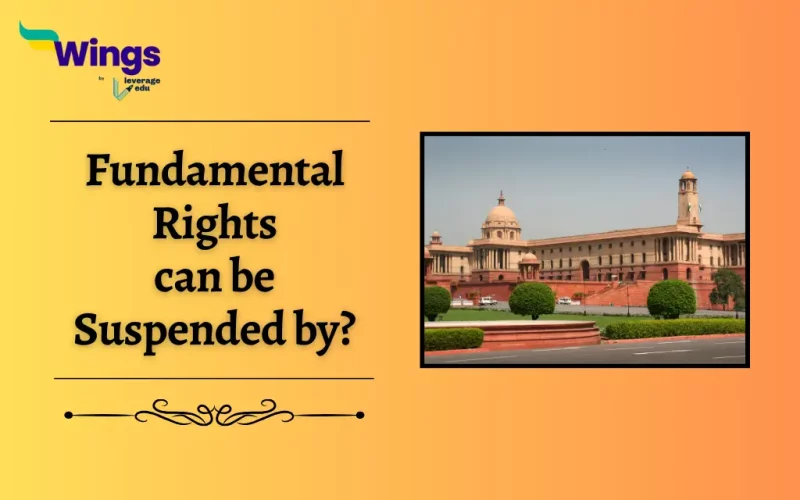Fundamental Rights in India are enshrined in Part III of the Indian Constitution, serving as the bedrock of individual freedoms and liberties. They are the cornerstones of a democratic society, protecting citizens against state actions that may infringe upon their rights. However, these rights are not absolute and can be suspended under specific circumstances. In this blog, we will explore the provisions and mechanisms through which Fundamental Rights can be suspended by ensuring a balance between personal freedoms and the needs of the state. Read our blog on how Fundamental Rights can be suspended by some ways.
Must Read: Right against Exploitation (Article 23-24)
Understanding Fundamental Rights
Fundamental Rights are a set of rights that are considered fundamental to the dignity and freedom of individuals. These rights include the right to equality, freedom of speech and expression, right to life and personal liberty, and many others. The framers of the Indian Constitution recognized the importance of these rights and included them in Part III. It is often referred to as the “heart and soul” of the Constitution.
Limitations on Fundamental Rights
Fundamental rights, while essential, are not absolute. The Constitution itself provides for reasonable restrictions on these rights. Moreover, to ensure that they are not abused or used to jeopardize the integrity and sovereignty of the nation. These restrictions are delineated in Article 19 of the Constitution, which outlines specific grounds on which the state can impose restrictions on the freedom of speech and expression.
Must Read: What Are Human Rights?
Who Can Suspend Fundamental Rights?
Fundamental rights can be suspended by:
Emergency Provisions
National Emergency (Article 352): The Constitution of India empowers the President to declare a National Emergency if the security and integrity of the nation are under threat due to war, external aggression, or armed rebellion. In such cases, the President can suspend some or all of the fundamental rights guaranteed by Part III of the Constitution. The suspension, however, is not automatic but requires a formal proclamation by the President.
President’s Rule (Article 356): In cases where there is a breakdown of constitutional machinery in a state, the President can impose President’s Rule under Article 356. While this doesn’t explicitly suspend fundamental rights, it allows for the suspension of the powers of the state government, thereby indirectly affecting the exercise of fundamental rights.
State of Emergency (Article 360): The Constitution also provides for a State of Emergency under Article 360 when there is a financial emergency in the country. In such circumstances, the President can give directions for the reduction of salaries and allowances of all or any class of persons serving in connection with the affairs of the state.
Implications of Suspending Fundamental Rights
When fundamental rights are suspended during a National Emergency, citizens’ rights can be curtailed in various ways, including:
- Censorship of the press and media to control the spread of information.
- The right to move freely throughout the territory of India can be restricted.
- The right to personal liberty may be suspended, leading to arbitrary arrests and detentions.
- Constitutional remedies like habeas corpus may be suspended, making it difficult for individuals to challenge their detention.
- The right to assemble peacefully and without arms can be curtailed, limiting public gatherings and protests.
- These suspensions are not intended to be permanent but are put in place to address the specific challenges posed by a National Emergency.
- The framers of the Constitution recognized that such provisions would be necessary under extreme circumstances. However, they also ensured that there were checks and balances in place to prevent their misuse.
Safeguards and Accountability
While the President has the authority to declare a National Emergency, it is not a unilateral decision. The Constitution imposes several checks and balances to prevent the arbitrary suspension of fundamental rights:
- The President can only declare a National Emergency on the written recommendation of the Cabinet.
- The proclamation of Emergency must be approved by both Houses of Parliament within one month.
- The Emergency proclamation is subject to judicial review, and the courts can examine its validity.
Historical Context
The Emergency provisions in the Indian Constitution were invoked only once in the history of the country, during the period of the 1975-77 Emergency. This period was marked by widespread criticism of civil liberties being curtailed, censorship, and the suspension of fundamental rights. The Emergency also led to significant amendments to the Constitution, emphasizing the need for greater safeguards to prevent its misuse.
Conclusion
In conclusion, Fundamental Rights in India are not absolute, and thus Fundamental Rights can be suspended by or restricted under specific circumstances. The Constitution provides for Emergency provisions that allow for such suspension during National Emergencies. But these provisions are not meant to be used lightly. The framers of the Constitution understood the importance of maintaining a balance between personal freedoms and the needs of the state. They built checks and balances to ensure that fundamental rights could only be suspended in extreme situations. It is vital to uphold and protect these rights as they are the essence of a democratic and inclusive society. The lessons from the past, particularly the 1975-77 Emergency, remind us of the importance of vigilance in safeguarding fundamental rights while recognizing the necessity of emergency provisions in a democratic nation.
Related Blogs
Lastly, we hope you liked our blog and gained an understanding of how Fundamental Rights can be Suspended by. Moreover, you may even read more blogs and empower yourself with knowledge regarding Civics and Polity!
 One app for all your study abroad needs
One app for all your study abroad needs













